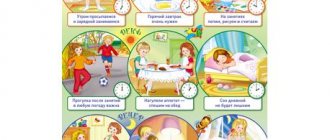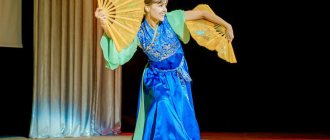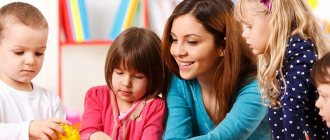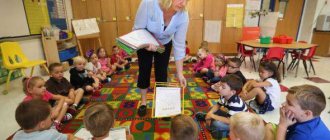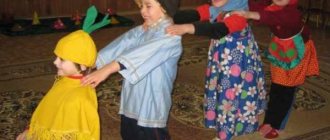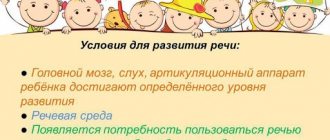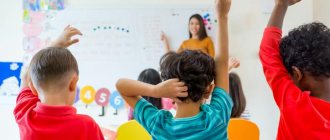Teacher self-development program
Galina Viktorovna Kulikova
Teacher self-development program
Self-development program.
Teacher Kulikova G. IN.
Just as no one can give to another what he himself does not have,
and cannot develop, educate others, those who
he himself is not developed, well-mannered and educated .
He is only able to actually educate and
educate while he works on his own education .
A. Diesterweg
Topic: “Speech development in preschool children through theatrical games”
Relevance:
In light of new trends in education, kindergartens need a teacher who is able to master new educational technologies in teaching and upbringing . Self-education of a teacher is a necessary condition for the professional activity of a teacher. In order to teach and educate others , you need to know more than everyone else.
Goal of self-development :
self-improvement of the professional activity of a teacher ,
improve your theoretical, scientific and methodological level,
professional skill and competence.
Program objectives :
increasing professional level and pedagogical skills through:
studying normative, educational, reference and scientific-methodological literature
completing advanced training courses and webinars
sharing your own teaching experience
creation of methodological developments and introduction of effective pedagogical experience in the development of coherent speech in children of senior preschool age, through theatrical games at work.
self-education
Main activities of self-development :
1.In the information area:
use of Internet and multimedia resources, educational programs and training materials;
creation of an electronic version of a methodological piggy bank using ICT technologies.
2. In the diagnostic and progmatic field :
improvement of types and forms of diagnostics, analysis and control;
mastering modern methods for diagnosing the comprehensive development of preschool children;
planning individual work with students based on diagnostic results;
determination of the level of development of coherent speech by the method of analysis and diagnostics, determination of the influence of theatrical games on the development of coherent speech in children of senior preschool age.
3.In the field of educational content:
application of acquired theoretical knowledge in practical activities;
didactic and methodological support of the educational process for the development of coherent speech in preschoolers;
study and dissemination of advanced pedagogical technologies;
formation of an educational environment that corresponds to the age, individual, psychological and physiological characteristics of students .
the formation of a general culture of the personality of each child, including the values of a healthy lifestyle, the development of his social, moral, aesthetic, intellectual, physical qualities, initiative, independence and responsibility .
participation in RMOs, seminars and master classes;
methodological seminars, workshops;
realizing your own creative abilities.
4.In the field of advanced training:
full-time and remote advanced training, online courses;
participation in trainings and business games, professional competitions and festivals and exhibitions.
Analysis of your teaching activities. ( self-knowledge )
I can
(My advantages)
Not always
(My cons)
Analyze your own teaching activities. Admit and correct your mistakes.
Use various types of games in educational, educational and developmental activities.
Choose an appropriate style of communication with students and their parents , based on mutual respect.
I use methods and techniques in accordance with the age, individual characteristics of the pupils , and the zone of proximal development.
Knowledge of ICT “Working with spreadsheets in MS Excel ”
“Creating computer presentations using MS PowerPoint” Encourage parents (legal representatives)
of students .
Choosing a topic for self-education ( self-determination )
Taking into account the results of self-analysis of my activities , I identified a topic for increasing self-education .
Topic: “Speech development in preschool children through theatrical games”
Goal: Increasing your theoretical level, professional skills and competence.
Tasks:
1. Stimulate interest in the proposed activity.
2. Involve children in joint theatrical activities;
3. Form an idea of different types of theater;
4. Develop speech, imagination and thinking;
5. Help timid and shy children engage in theatrical play.
To develop parents’ interest in working together in this direction
Planned results.
The result of the implementation of the self-development program is the following indicators:
1. Ability to analyze scientific and methodological literature.
2. Mastery of effective methods and techniques for the development of coherent speech in older preschoolers through theatrical games.
3. Dissemination of one’s own teaching experience.
Literature:
1. Educational program of MBDOU “Kindergarten No. 99”
№ 99.
2. Program "Childhood"
.
3. O. S. Ushakova “Theory and practice of speech development in preschoolers”
, LLC
Sfera shopping
Moscow 2008
4. O. S. Ushakova “ Program for the development of speech for preschoolers”
, LLC
Sfera shopping
Moscow 2013
5. O. S. Ushakova “Speech development of children 5-7 years old”
LLC
Sfera shopping
Moscow 2014
6. O. S. Ushakov “Familiarization of preschool children with literature and speech development”
LLC
Sfera shopping
Moscow 2014
7. O. S. Ushakov, E. M. Strunina “Speech development in children 6-7 years old”
, Moscow publishing house
2011
8. Educational field “Speech development”
methodological kit
program “Childhood”
St. Petersburg
“DETSVO – PRESS”
2016
9. T. A. Egorova “Comprehensive lessons on fairy tales for children 4-6 years old”
, publishing house
"Teacher"
Volgograd 2014
10. R. A. Zhukova “Theatrical activities. “Entertaining materials. Preparatory group"
, Publishing house
"Corypheus"
Volgograd 2010
11. G. P. Fedorova “We sat on the zloty ring”
St. Petersburg
“DETSVO – PRESS”
2003
12. A. I. Bure “Theater of Everything”
LLC "Editorial staff of the magazine
"Musical Palette"
2002
13. N. F. Sorokina “Playing puppet theater”
program “Theatre - creativity - children” “Arkti”
Moscow 2002
14. N. D. Sorokina “Scenarios for theatrical puppet classes”
15. T. N. Karamenko “Puppet theater in kindergarten”
Uchpedgiz 1955
16. L. B. Gavrisheva “Music, play - theater!”
St. Petersburg
“DETSVO – PRESS”
2004
17. T. I. Petrova, E. L. Sergeeva, E. S. Petrova “theatrical games in kindergarten”
Moscow
"School Press"
2000
18. E. G. Churilova “Methodology and organization of theatrical activities of preschoolers and junior schoolchildren”, Moscow “VLADOS”
2001
19. A. E. Antipina “Theatrical activities in kindergarten”
LLC
Sfera shopping
Moscow 2003
20. O. N. Pakhomova “Good fairy tales, Ethics for kids”
, Moscow 2006
21. A. K. Bondarenko “Word games in kindergarten”
Moscow
“Enlightenment”
1974
22. S. A. Stepanova “Development of the speech voice of children aged 6 to 9 years”
Scientific Research Social Pedagogical Institute of Valeology and Human Ecology 1996
23. G. V. Lapteva “Games for the development of emotions and creativity”
. Theater classes for children 5-9 years old. S. -P.: 2011
24. I. A. Lykova “Shadow theater yesterday and today”
S. -P.: 2012
25. O. G. Yarygina “Workshop of Fairy Tales”
M.: 2010
26. A. N. Chusovskaya “Scripts for theatrical performances and entertainment”
M.: 2011
27. Artemova L. V. “Theatrical games for preschoolers”
M.: 1983
28. E. V. Migunova “Theater pedagogy in kindergarten”
. Guidelines. M.: 2009
The first thing that was done was an examination using the ECERS-R scale at preschool sites where teacher training was planned. We were guided by the Federal State Educational Standard for preschool education, and this gave us an idea of what kind of teacher is needed today. But it was important to study it continuously and at the same time answer the questions: what kind of teacher is today, what does he possess, what professional difficulties does he experience, what values characterize him? It is also necessary to understand what his personal and professional needs are. Only by meaningfully comparing what it should be with what it is now, we were able to understand what would be the content of the educational program for educators. The study revealed problem areas in their activities. For example, all kindergartens received only 2.9 points for the design of space in groups.
Experts noted a very weak visual, informative, and textual design of the environment; there were few interesting play centers in the groups, the space for games was inconveniently zoned, and exhibitions of children’s works were more for parents than for children.
The second is working with the values of the kindergarten and the teacher himself. It is important to create conditions for the emergence of a single semantic field and the acceptance of the values of preschool childhood: acceptance (support for the diversity of childhood; preservation of the uniqueness and intrinsic value of childhood as an important stage in the overall development of a person, the intrinsic value of childhood - understanding (considering) childhood as a period of life that is significant in itself, without any conditions; significant because of what is happening to the child now, and not because this period is a period of preparation for the next period; respect for the child’s personality At this stage, a situation of trust is formed among teachers in those who teach them, which is the main motivation for effective learning.
Third, trainings that take place actively. Educators not only gain knowledge, they discover themselves through drawing, interactivity, play, theater, and mastering new technologies in their activities. And the best way to “feel” it is in the process of its development and reflection.
The fourth is supervision (a form of consultation during the work of a teacher in a group, which allows you to see, realize, understand and reflectively relate to your professional actions), another discovery of the effective development of technology by teachers.
Supervision allows you to do more than just see how educators put into practice the technologies they studied during the training.
They receive feedback from an expert, analyzing problematic situations together here and now.
Fifth, this is an internship test, when a teacher can try on someone else’s pedagogical technology in the kindergarten where the internship takes place.
Sixth is reflection, which takes place after each training, supervision, and internship.
On February 21, a seminar “Development Management in Preschool Education” was held, in which educators and experts participated. They discussed the results of the work and further prospects for the implementation of projects in the Troitsky and Novomoskovsky districts of Moscow.
It has become clearly visible (including in numbers) that the point of no return has been passed and many preschool sites demonstrate a very good level.
If four years ago the overall situation was very average - 3.3 points according to ECERS, now it is a strong 4-5-6 points.
Moreover, this can be said based not on the expertise of an external expert, but on an honest self-assessment (this is also an important step!).
The following important aspects of work remain in the zone of proximal development:
Formation of communicative competencies, including in communication with parents.
The issues of correctly arguing one’s position, building a dialogue both with parents and with colleagues at other sites, with school teachers, etc. are still relevant.
Flexible planning.
Despite the fact that some playgrounds are already developing their own models of flexible plans, children are no longer highly organized when everything is clear and according to plan. However, some preschool sites have their own “distortions” in one direction or another: either “life from children” is built, but educational tasks and work in the zone of proximal development suffer, or, on the contrary, the plan takes over and there is a lack of free activity and games. This is a very important and fragile balance and a lot of work.
Working with rules, children's independence and subjectivity.
We observe that rules have emerged in almost all sites. They were created by the hands of children, and this is important. But there are nuances. How independent are children in following rules? Or are the rules still the prerogative of adults, even though they were drawn by children? And how are things going with independence in the garden?
For example, some Montessori practices include much more self-care skills: children iron their own towels, wash their plates, etc.
And can the rules concern feelings and the freedom to express them in children or just behavior? What if children offer a “don't get angry” or “don't get upset” rule? How to deal with this? These are all important issues to discuss.
Development of an educational environment on outdoor playgrounds.
In many complexes, areas are still assigned to a separate group, although a walk is a rare time for children of different ages to interact. Gross motor equipment is also not always age-appropriate, multi-skill, and does not provide the risk-taking required for children to explore their abilities.
For example, a “balancer” develops balancing skills, and elements of a sports complex, such as stairs, a horizontal bar, a rope, a climbing wall, a slide, develop dexterity, the ability to control one’s body, etc.
The presence of such equipment of varying levels of complexity gives the child a kind of “challenge”, inviting him to develop bodily capabilities, comprehending ever new spaces.
This also applies to physical education classes. There is room to move.
Personal development of a teacher.
Each team in this field may have its own development trajectories. At some sites, there is a demand for the development of critical thinking, when you need to analyze yourself and your practice more deeply and clearly, bring ideas and findings to a more meaningful level, etc. Somewhere, on the contrary, a situation arises with the need to live feelings more deeply and allow oneself to be inactive, when it is difficult for a very active and active team to stop and “breathe”, not run, “be with it” and look at everything with a fresh look.
We are like children. If we don't take a break, neither will they.
This is work based on individual requests and programs. Deeper focus on problems. Absolutely, there is no individualization in children without individualization in adults. After all, only when adults have their own experience of individualized learning, they learn to hear themselves, accept their needs and feelings, not be afraid of different worldviews, their own and other people’s characteristics - then true individualization in relation to children becomes possible.
Spread good practices inside and outside the complex.
In our work on internship sites, we came to the conclusion that teachers are afraid to face the resistance of colleagues who do not work according to the Federal State Educational Standard; they immediately want to devalue themselves, modestly say, “that this is just our experience,” etc.
In fact, working with resistance, as well as building a training or internship program, are separate skills; there are many technological techniques that can be learned and applied.
So there is room to grow and at the same time there is already something to share.
Responsibilities of the senior teacher
The senior teacher must provide high-quality supervision of the activities of the less experienced teaching staff of the kindergarten. Its functions are prescribed in the job description. We will talk about the main ones.
- Planning and implementation of the educational process in accordance with the program established by the state.
Typically, the senior teacher creates a plan for the entire school year.
- Monitoring the activities of teaching staff.
Carried out in current and final mode. This does not mean that the senior teacher constantly monitors the work of other educators; he has the right to organize a convenient observation process and reporting form and visit the group with a control visit, for example, once a month.
- Monitoring results
(setting goals, selecting assessment methods). The dynamics of children's development is checked by ordinary teachers, after which they give the final results for reporting to the senior teacher.
- Interaction with parents
– consultations, assistance in implementing the educational process, resolving emerging issues.
- Conducting teacher councils and public events
for teachers and children.
- Providing methodological assistance in employee training.
This includes issuing benefits, assigning a more experienced employee to a novice teacher, and assessing the relevance of the competencies of the preschool teaching staff.
Work on self-education of a teacher according to the Federal State Educational Standard
The work of a teacher is a very creative process. You simply cannot do without constant self-improvement. Within the framework of the Federal State Educational Standard, new pedagogical ideas and technologies appear, mastering which you can easily achieve your goals.
Self-education work is characterized by:
- Continuity and systematicity;
- Relationships with other subject areas;
- Compliance of the theme with the overall development strategy of the institution;
- Availability of selected pedagogical technologies for the planned age of the child.
The professionalism of the teaching staff determines the prestige of the kindergarten as a whole. Parents nowadays carefully select an educational institution for their child, study reviews, performance results, personal characteristics of employees, methods of pedagogical influence. Many understand the intricacies of organizing preschool education, programs and technologies. Raising the level of an institution is only possible with an integrated approach to the system of advanced training.
Pedagogical skill consists of the level of training, a creative approach to the implementation of plans, and mastery of modern methods and techniques. All this can be achieved with a responsible and conscious approach to self-education.
The leading role in creating the need for self-education belongs to the administration of the institution. Creating conditions for a responsible attitude towards the level of one’s training and degree of proficiency in the profession is a priority task when creating a creative and mobile team.
Challenges faced by senior educators
- Promotion to the position of senior teacher (methodologist) is recognition by the authorities of the preschool educational institution of your teaching experience, leadership and personnel management abilities. Therefore, the main difficulty is a high degree of responsibility, because it is the senior teacher who will be in demand for correct documentation, competent activities of the teaching staff and the results of the learning and development of children in a kindergarten.
- The senior teacher, along with the leader, is responsible for the life and health of preschoolers, so there is a possible risk of emotional burnout.
- Working closely with superiors also involves serious stress, because it is not so easy to constantly feel under control.
- A specialist may encounter difficulties in managing a team - all teachers have an individual temperament and character.
- The senior teacher must be stress-resistant and well-versed in psychology, because in the process of work he will have to solve many problematic issues and communicate with different people, who are not always pleasant and disciplined.
- But the specialist himself will have to carefully monitor his organization; without this quality, it is basically impossible to lead people.
Activities of a senior teacher in a modern preschool educational institution
The rapid growth in the development of education in our country certainly affects the activities of modern kindergartens and their employees. The position of senior educator requires that he be aware of all current innovations in the children's education system. Therefore, the ability of the senior educator’s personality to analyze will be so important in order to be able not only to assess the quality of educational literature, but also to be able to select exactly the information that is suitable for the work of a particular preschool institution.
Knowledge of modern technologies will help you quickly maintain all the necessary reporting documentation, systematize information, monitor children’s achievements and prepare presentations. The senior educator must not only be able to perform all these actions himself, but also teach them to less experienced preschool employees.
So, from all of the above it follows that today a senior teacher/methodologist is, first of all, an expert analyst, an innovator who knows how to multitask, organize effective and experimental activities in his kindergarten, knows about new information technologies, able to listen and hear people.
